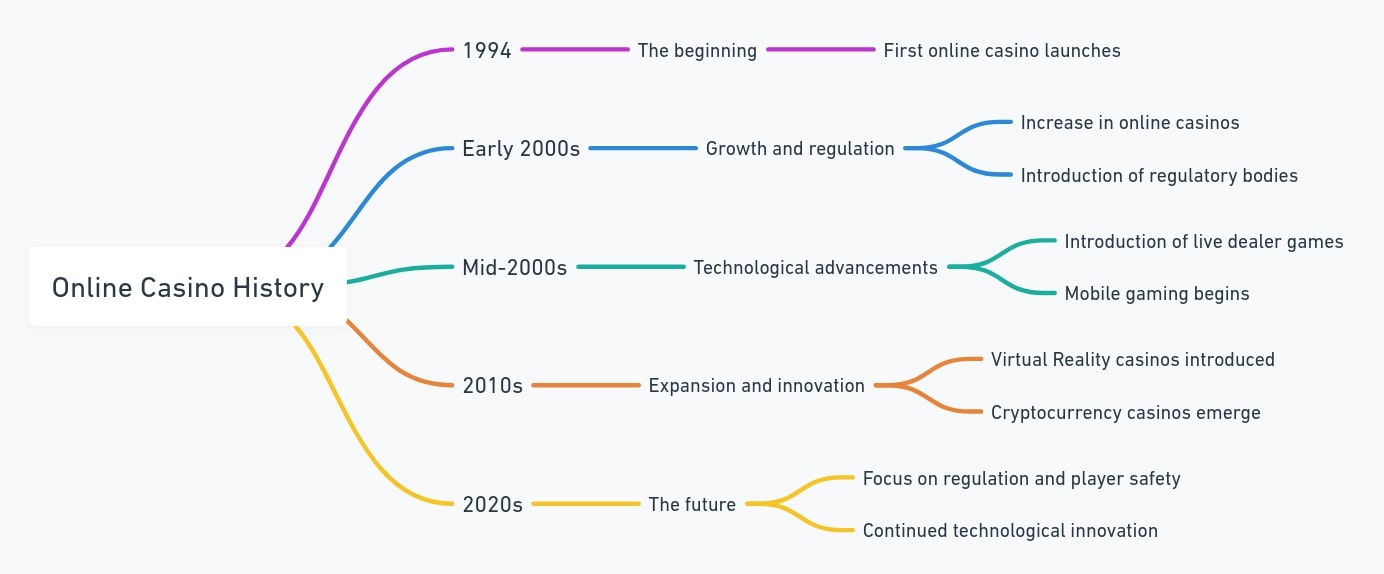The History of Online Casinos: How It All Began

The fascinating journey of online casinos began more than two decades ago, marking a significant milestone in the world of gambling and entertainment. This innovative leap transformed the traditional casino experience, making it accessible to millions worldwide from the comfort of their homes. The inception of the first online casino was a groundbreaking event that not only introduced a new form of entertainment but also set the stage for an industry that would grow exponentially in the years to come. As we delve into the history of online casinos, we uncover the technological advancements, regulatory challenges, and the relentless pursuit of providing a secure and engaging platform for gamblers around the globe. This narrative is not just about the evolution of online gambling; it’s a testament to the ingenuity and adaptability of the digital age.
Table of Contents
The Dawn of Online Gambling
The advent of online gambling marked a revolutionary shift in the casino industry, allowing players worldwide to experience the thrill of betting from their own homes. This evolution began with the launch of the first online casino, leading to the establishment of legal frameworks and significant technological advancements.
The First Online Casino: A Milestone
The journey into online gambling commenced in 1994 when the first online casino was launched. This pioneering platform, powered by software developed by Microgaming, offered a limited array of games but represented a significant leap forward in the way people gambled. It was a concept that was ahead of its time, promising a future where gambling was accessible, convenient, and diverse.
Regulatory Beginnings: The Establishment of Legal Frameworks
As online casinos began to gain popularity, the necessity for regulation became apparent. The establishment of legal frameworks was crucial to ensure a safe and fair gambling environment for players. In 1996, the Kahnawake Gaming Commission was formed in Mohawk Territory of Kahnawake, Canada, becoming one of the first regulatory bodies to issue licenses to online gambling operations. This was a pivotal moment in online gambling history, setting a precedent for the regulation of the industry.
Technology Evolution: From Dial-up to Broadband
The evolution of technology played a fundamental role in the growth of online casinos. Initially, the internet’s slow speed and unreliability, typical of dial-up connections, presented challenges. However, the transition to broadband internet in the early 2000s significantly improved the online gambling experience by offering faster, more stable connections. This technological leap enabled the development of more complex and interactive games, transforming online casinos into the immersive platforms we know today.
Key Milestones in Online Gambling Technology
- 1994: Launch of the first online casino
- 1996: Establishment of the first gambling commission
- 2000s: Shift from dial-up to broadband
Regulatory Milestones
- Formation of Kahnawake Gaming Commission
- Introduction of the UK Gambling Act
- Implementation of the UIGEA in the USA
Technological Advancements
- Dial-up to Broadband: Enhancing connectivity and game quality
- Mobile Gaming: Expanding accessibility and convenience
- Live Dealer Games: Bridging the gap between online and physical casinos
Table: Evolution of Online Gambling
| Year | Milestone |
|---|---|
| 1994 | First online casino launched |
| 1996 | Kahnawake Gaming Commission established |
| 2000 | Transition from dial-up to broadband |
| 2000s | Introduction of mobile gaming |
The transformation from the first online casino to today’s sophisticated platforms illustrates the rapid advancement and adaptability of the online gambling industry. Through regulatory efforts, technological advancements, and the continuous pursuit of providing a secure and engaging gambling experience, online casinos have become a mainstay in the entertainment world.

The Rise of Online Casinos
The Rise of Online Casinos has been a pivotal chapter in the digital transformation of gambling, characterized by rapid technological advancements and an ever-expanding variety of games. This evolution can be attributed to three major factors: the expansion of game varieties, the influential role of software providers, and the revolutionary impact of mobile gaming on accessibility.
The Expansion of Game Varieties
Initially, online casinos offered a limited selection of classic games, such as blackjack and roulette. However, the demand for more immersive and varied gaming experiences led to an explosion in the variety of games available. Today, players can enjoy a vast array of games, from traditional table games to modern video slots, each with unique themes and innovative features.
- Table Games: Poker, Baccarat, Craps
- Slots: Classic, Video, Progressive Jackpots
- Specialty Games: Bingo, Keno, Scratch Cards
The Role of Software Providers in Shaping the Industry
Software providers are the backbone of online casinos, responsible for developing the games and platforms that players interact with. Companies like Microgaming, NetEnt, and Playtech have been instrumental in driving innovation, creating games with stunning graphics, captivating soundtracks, and engaging gameplay mechanics. Their commitment to quality and innovation has set industry standards and contributed to the diverse gaming ecosystem we see today.
Key Software Providers
| Provider | Founded | Notable Games |
|---|---|---|
| Microgaming | 1994 | Mega Moolah, Thunderstruck II |
| NetEnt | 1996 | Starburst, Gonzo’s Quest |
| Playtech | 1999 | Age of the Gods, Gladiator |
The Impact of Mobile Gaming on Casino Accessibility
The advent of mobile gaming has significantly altered the landscape of online gambling, making it accessible to a wider audience. The ability to play casino games on smartphones and tablets has not only increased convenience but also opened up new markets. Developers now prioritize mobile compatibility, ensuring games are optimized for a seamless mobile experience.
- Increased Accessibility: Play anywhere, anytime
- Convenience: No need for a desktop computer
- Market Expansion: Reaching a wider audience
Evolution of Mobile Gaming
| Year | Milestone |
|---|---|
| 2005 | Introduction of basic casino games on mobile |
| 2010 | Launch of dedicated mobile casino apps |
| 2015 | Shift towards HTML5 for cross-platform games |
| 2020 | Rise of AR and VR in mobile gaming |
The combined impact of these factors has not only led to the rise of online casinos but also ensured their place as a staple in the entertainment industry. The future of online gambling looks promising, with continual innovations aimed at enhancing player experience and expanding the reach of online casinos globally.
Challenges and Milestones in the History of Online Casinos
The evolution of online casinos has been marked by significant challenges and milestones that have shaped the industry into what it is today. These developments have navigated through legal and regulatory hurdles, addressed security concerns, and celebrated the growth of progressive jackpots, contributing to the global popularity and acceptance of online gambling.
Legal and Regulatory Hurdles
The inception of online casinos brought about a myriad of legal challenges. Different jurisdictions have varying laws concerning gambling, making the global operation of online casinos a complex legal puzzle. Initially, there was a lack of clear regulation, leading to a wild west-like environment. Over time, countries began to introduce specific online gambling legislation, creating a more structured and safe environment for both players and operators.
- Key Regulations Introduced:
- The Free Trade and Processing Act (Antigua and Barbuda)
- The Gambling Act 2005 (UK)
- The Unlawful Internet Gambling Enforcement Act (U.S., 2006)
Security Concerns and Solutions
Security has always been a paramount concern in the online casino industry. In the early days, the internet was rife with security loopholes. However, the industry has made significant strides in enhancing security measures to protect players’ information and ensure fair play.
- Major Security Enhancements:
- Encryption Technologies: Implementation of SSL (Secure Socket Layer) encryption to safeguard data transmission.
- Random Number Generators (RNGs): Ensuring game fairness by generating random outcomes.
- Two-Factor Authentication (2FA): Adding an extra layer of security for user accounts.
Major Wins and the Growth of Progressive Jackpots
Progressive jackpots have played a crucial role in attracting players to online casinos. These jackpots increase every time a game is played but not won, often resulting in life-changing sums for the lucky winners. The allure of winning big has contributed significantly to the industry’s growth and player engagement.
- Notable Progressive Jackpot Wins:
- $24 million on Mega Fortune (2013)
- £13.2 million on Mega Moolah (2015)
| Milestone | Description |
|---|---|
| First Online Casino Launch | The launch of the first online casino in the mid-90s, offering a limited range of games. |
| Introduction of Live Dealers | The mid-2000s saw the introduction of live dealer games, enhancing the realism of online casinos. |
| Mobile Gaming Revolution | The 2010s marked the rise of mobile gaming, making online casinos accessible from anywhere. |
Through addressing legal and regulatory challenges, implementing robust security measures, and celebrating major wins, the online casino industry has not only survived but thrived, evolving into a multi-billion dollar industry. The journey of online casinos is a testament to the resilience and innovation of the gambling and technology sectors, promising an exciting future with further advancements and growth.
The Modern Era of Online Casinos
The landscape of online casinos has undergone significant transformation with the advent of new technologies. Among these, live dealer games, cryptocurrencies, and the potential of virtual and augmented reality (VR/AR) stand out as monumental shifts.
The Integration of Live Dealer Games
Live dealer games have revolutionized the online casino experience by bringing the real-time, interactive casino experience to players’ screens. These games bridge the gap between online and land-based casinos, offering games like blackjack, roulette, and baccarat hosted by real dealers. This innovation has allowed players to enjoy an immersive gambling experience, enhanced by HD streaming and interactive features.
Benefits of Live Dealer Games:
- Enhanced trust and transparency
- Real-time interaction with dealers and players
- Immersive casino experience from home
Cryptocurrencies and Blockchain Technology
The adoption of cryptocurrencies and blockchain technology has provided a new dimension of security and anonymity to online gambling. These technologies ensure transparent and verifiable transactions, reducing the risk of fraud and unauthorized access.
Advantages of Cryptocurrencies in Online Casinos:
- Enhanced security and privacy
- Faster transactions with lower fees
- Accessibility for users in regions with restrictive gambling laws
The Future of Virtual and Augmented Reality in Online Gambling
VR and AR technologies are poised to redefine the online gambling experience by creating highly immersive environments that mimic the feel of being in a physical casino. While still in the nascent stages, the potential for VR/AR in online casinos is vast, offering a level of engagement and realism previously unimaginable.
Potential Impacts of VR/AR:
- Immersive 360-degree gambling environments
- Enhanced social interactions among players
- Realistic simulation of casino games and environments
Innovative Features in Modern Online Casinos
| Feature | Description | Impact |
|---|---|---|
| Live Dealer Games | Real-time games with human dealers | Bridges gap between online and physical casinos |
| Cryptocurrencies | Use of digital currencies for transactions | Increases security and privacy |
| VR/AR Technologies | Immersive technologies for realistic gambling experiences | Enhances user engagement and interaction |
The integration of these technologies into online casinos has not only enhanced the user experience but also opened up new avenues for growth and innovation in the gambling industry. As these technologies continue to evolve, the future of online gambling looks brighter than ever, promising an unparalleled experience for players around the globe.
Conclusion
The evolution of online casinos represents a fascinating journey of innovation, overcoming regulatory challenges, and adapting to technological advancements. From the rudimentary beginnings of the first online casino to today’s sophisticated platforms offering a wide array of games, live dealer experiences, and the integration of blockchain technology, the industry has continually evolved to meet the demands of a growing and diverse player base. As we look to the future, the potential for further innovation, including virtual and augmented reality, promises to redefine the online gambling experience, making it more immersive and accessible than ever before. The journey of online casinos is far from over; it is a sector ripe with potential for continued growth and transformation, ensuring that the world of online gambling remains at the forefront of digital entertainment.
